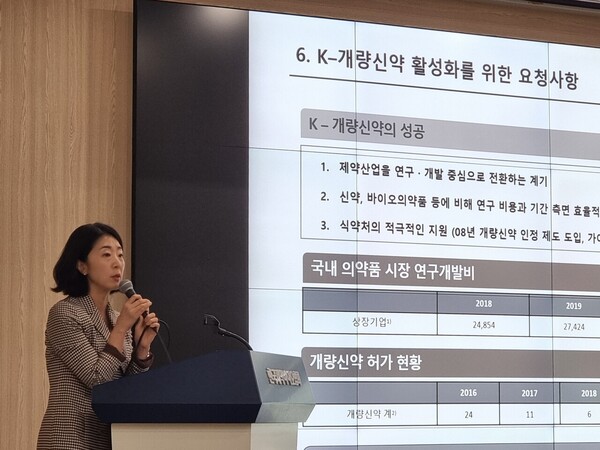Domestic pharmaceutical companies have made policy recommendations to speed up the development of incrementally modified drugs (IMDs) to the Ministry of Food and Drug Safety.

Kim Jin-ah, a managing director who leads Boryung’s development strategy office, explained the development process of Dukarb Plus Tab (fimasartan-amlodipine-hydrochlorothiazide), a compound hypertension treatment during a symposium to support the K-IMD sector held on the auspices of the ministry on Tuesday.
About 150 people responsible for R&D and RA (regulatory affairs) at the domestic biopharmaceutical companies, including Yuhan, Chong Kun Dang, JW, Boryung, and Icure, attended the workshop, sharing information on their development status and examples of new formations, doses, and compounds.
Managing Direct Kim offered some policy suggestions and know-how to become successful in the IMD business during her presentation.
“Our company reflected the needs of the clinical fields, with criteria for diagnosing hypertension being lowered and initial medication actively recommended,” Kim said. “In addition, the material patent for Kanarb was scheduled to expire in February 2023, so it was necessary to maintain the company’s market position through developing various combinations of Kanarb families.”
Kim explained that as Dukarb Plus Tab was initially developed for overseas sale, the company conducted its phase 3 clinical trial as compounds, not as a combined therapy.
Noting that some countries, including Russia and China, tended not to recognize clinical trials of combined therapies, Kim emphasized that when Korean makers export their products to countries without guidelines on developing compound drugs, they must carefully examine the host countries’ regulations.
Kim also recalled the experience of the regulator’s detection of sartan-family AZBT impurities in June 2021.
Explaining that the company submitted a report on the possibility of such an occurrence and changed its registration on the drug master file (DMF) to the ministry, she said. “A careful look at news regarding impurity detection at home and abroad and preparing for such situations will help prevent delayed approval,” Kim added.
Managing Director Kim also made proposals to develop IMDs on behalf of the industry, recommending that the regulatory authorities ease entry conditions for phase 3 clinical trials when the domestic makers develop new compound drugs with abundant experiences of combined administration.
Kim also pointed out that although R&D spending on IMDs is on the rise, the number of such drugs is declining.
“There may be some ambiguities regarding what abundance means. However, we can confirm the number of combined administrations by looking at insurance application figures at Health Insurance Review and Assessment Service (HIRA),” she said. “I request the regular exempts the submission of data on repetitive toxicity or drug-drug interactions (DDI) or allows their submission in the approval stage. That will help to save time and money for developing compounds.”
Managing Director Kim asked to acknowledge the feasibility of developing IMDs by reflecting the needs of the medical field and easing conditions for developing contents for appropriate dose administration while within the preset usage and dose range.
“I also ask the authorities to review overseas licensing cases, clinical papers, and others as a basis for proving the needs of medical fields,” Kim said. “It will help to prevent the abandonment of drugs with high clinical needs but expense costs due to financial burdens.”

